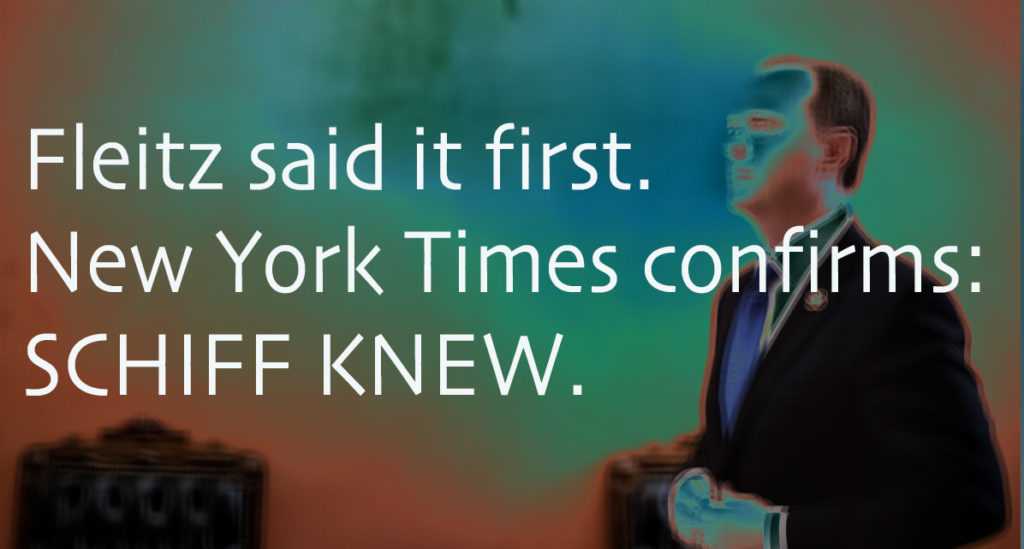New York Times confirms Fleitz: Schiff already knew about whistleblower

The New York Times has confirmed Center for Security Policy President Fred Fleitz’s analysis that House Intelligence Committee Chairman Adam Schiff had advance knowledge of the whistleblower who accused President Trump of wrongdoing in a conversation with the president of Ukraine.
“Schiff Got Early Account of Accusations as Whistle-Blower’s Concerns Grew,” said an October 2 New York Times headline, published just hours after Fleitz had told CNN’s Chris Cuomo of his own conclusions drawn from years as a professional intelligence analyst.
Fleitz called it publicly on September 26.
CNN’s Chris Cuomo tried to knock down Fleitz on October 1. The next day, the New York Times confirmed that Fleitz had it right all along.
“The Democratic head of the House Intelligence Committee, Representative Adam B. Schiff of California, learned about the outlines of a C.I.A. officer’s concerns that President Trump had abused his power days before the officer filed a whistle-blower complaint, according to a spokesman and current and former American officials,” the Times reported a week later.
The Times gave no credit to Fleitz.
“The NYT confirmed what I said last week,” Fleitz tweeted in an October 2 thread: “Schiff knew about the CIA whistleblower in advance — way in advance. Before he even filed his complaint. This is a much bigger scandal that people realize. At a minimum, Schiff should recuse himself from this impeachment inquiry.”
Fleitz good-naturedly took a poke at Cuomo in a tweet that morning, at which point Cuomo invited the Center for Security Policy president to appear on his show again. The two will be back on the air together on Monday, October 7.
Fleitz figured it out early
A week earlier, on September 26, Fleitz had tweeted:
“As a former CIA analyst and former NSC official who edited transcripts of POTUS phone calls with foreign leaders, here are my thoughts on the whistleblower complaint which was just released.
“2/ This is not an intelligence matter. It is a policy matter and a complaint about differences over policy. Presidential phone calls are not an intelligence concern. The fact that IC [intelligence community] officers transcribe these calls does not give the IC IG [inspector general] jusrisdiction over these calls.
“3/ It appears that rules restricting access and knowledge of these sensitive calls was breached. This official was not on this call, not on the approved dissem list and should not have been briefed on the call.“3 [sic]/ The way this complaint was written suggested the author had a lot of help. I know from my work on the House Intel Commitee staff that many whistleblowers go directly to the intel oversight committees. Did this whistleblower first meet with House Intel committee members?“4/ It is therefore important that Congress find out where this complaint came from. What did House and Senate intel committee dem[ocrat] members and staff know about it and when? Did they help orchestrate this complaint?“5/ My view is that this whistleblower complaint is too convenient and too perfect to come from a typical whistleblower. Were other IC officers involved? Where outside groups opposed to the president involved?“6/ This complaint will further damage IC relations with the White House for many years to come because IC officers appear to be politicizing presidential phone calls with foreign officials and their access to the president and his activities in the White House.“7/ Worst of all, this IC officer — and probably others — have blatantly crossed the line into policy. This violates a core responsibility of IC officers is to inform, but not make policy.
“8/ This is such a grievous violation of trust between the IC and the White House that it would not surprise me if IC officers are barred from all access to POTUS phone calls with foreign officials.”
- Our intelligence agencies went rogue. Now they feel threatened. - April 1, 2024
- You’ve heard about weaponization of the FBI and CIA; now they’re weaponizing the internet - March 29, 2024
- CIA’s new mission: Wokeness over expertise - March 11, 2024
